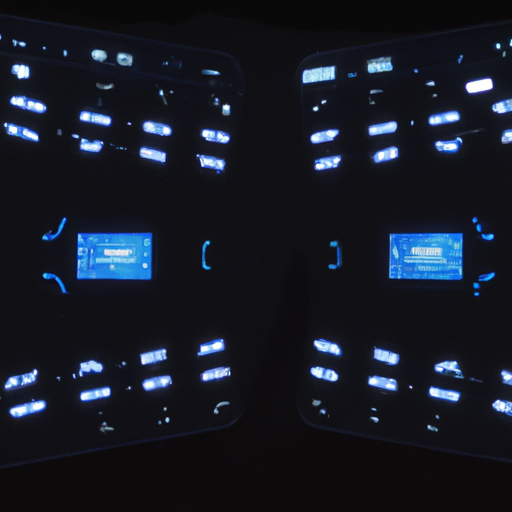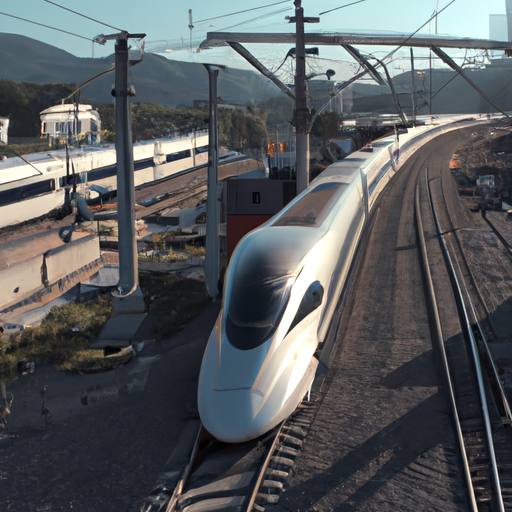-
Table of Contents
- Introduction
- Introduction to Contemporary Tech Innovations
- Artificial Intelligence: Beyond Human Intellect
- Blockchain Technology: A New Era of Transparency
- Virtual and Augmented Reality: Bridging Digital and Physical Worlds
- Green Tech: Pioneering Sustainable Solutions
- Future Tech Trends: What Lies Ahead
- Q&A
- Conclusion
“Tech Horizons: Illuminating the Future with Modern Innovations”
Introduction
Tech Horizons: Unveiling Modern Innovations is a comprehensive guide that explores the latest advancements in technology. It provides an in-depth look into the world of Modern Innovations, from artificial intelligence and machine learning to blockchain and cybersecurity. The guide aims to demystify complex tech concepts, making them accessible to a broad audience. It also highlights the impact of these innovations on various industries, economies, and societies, offering a holistic view of the rapidly evolving tech landscape.
Introduction to Contemporary Tech Innovations
As we stand on the precipice of a new era, the Tech Horizons are expanding at an unprecedented pace, unveiling Modern Innovations that are reshaping our world. The advent of contemporary tech innovations is not only revolutionizing industries but also transforming our daily lives, making them more convenient, efficient, and connected.
The digital revolution, which began with the birth of the internet, has now evolved into a technological renaissance, characterized by the emergence of artificial intelligence (AI), machine learning, Blockchain Technology, and the Internet of Things (IoT). These innovations are not just buzzwords; they are the driving forces behind the fourth industrial revolution, a new phase in human development that is blurring the lines between the physical, digital, and biological spheres.
Artificial intelligence, for instance, is no longer a concept confined to science fiction. Today, AI is a reality that is permeating every facet of our lives, from our smartphones to our cars, and even our homes. AI-powered virtual assistants like Siri, Alexa, and Google Assistant are making our lives easier by automating routine tasks, while AI-driven algorithms are helping businesses make more informed decisions by analyzing vast amounts of data in real-time.
Similarly, machine learning, a subset of AI, is enabling computers to learn from experience and improve their performance without being explicitly programmed. This technology is being used in a myriad of applications, from predictive analytics and fraud detection to personalized marketing and recommendation systems.
On the other hand, Blockchain Technology, best known for powering cryptocurrencies like Bitcoin, is proving to be a game-changer in sectors beyond finance. Its decentralized, transparent, and secure nature is being leveraged to create tamper-proof systems for supply chain management, healthcare records, and even voting systems.
Meanwhile, the Internet of Things is connecting the physical and digital worlds like never before. By embedding sensors and software in everyday objects, IoT is creating a network of interconnected devices that can communicate and interact with each other. This technology is paving the way for smart homes, smart cities, and even smart industries, where devices can autonomously exchange data and make decisions.
However, as we embrace these Modern Innovations, it is crucial to also consider the challenges they pose. Issues such as data privacy, cybersecurity, and the ethical implications of AI are becoming increasingly important. As we continue to push the boundaries of technology, we must also ensure that we are doing so responsibly, with a focus on safeguarding our privacy, security, and ethical values.
In conclusion, the Tech Horizons are indeed expanding, unveiling Modern Innovations that are transforming our world. As we stand on the brink of this technological renaissance, it is clear that these contemporary tech innovations are not just reshaping industries and revolutionizing our daily lives, but also redefining what it means to be human in the digital age. As we navigate this brave new world, it is our responsibility to harness these technologies for the greater good, while also addressing the challenges they pose. The future of technology is here, and it is up to us to shape it.
Artificial Intelligence: Beyond Human Intellect
As we stand on the precipice of a new era, the Tech Horizons are expanding at an unprecedented rate, unveiling Modern Innovations that are reshaping our world. One such innovation that has been making waves in the tech industry is Artificial Intelligence (AI), a technology that is pushing the boundaries of human intellect and transforming the way we live, work, and interact.
Artificial Intelligence, in its simplest form, is the simulation of human intelligence processes by machines, particularly computer systems. These processes include learning, reasoning, problem-solving, perception, and language understanding. However, AI is not just about mimicking human intelligence; it’s about augmenting it, enhancing it, and in some cases, even surpassing it.
The potential of AI is immense and its applications are far-reaching. From healthcare to finance, education to entertainment, AI is revolutionizing every sector. In healthcare, AI algorithms are being used to predict diseases, personalize treatments, and improve patient care. In finance, AI is helping to detect fraudulent transactions, automate trading, and provide personalized financial advice. In education, AI is transforming the learning experience by providing personalized learning paths, instant feedback, and intelligent tutoring. In entertainment, AI is creating new forms of interactive experiences, from AI-generated music and art to AI-powered virtual reality games.
But AI is not just about improving efficiency and productivity; it’s also about tackling some of the world’s biggest challenges. AI is being used to combat climate change by optimizing energy use, predicting weather patterns, and monitoring deforestation. It’s being used to address global poverty by identifying patterns in economic data, predicting crop yields, and optimizing resource allocation. It’s being used to promote social justice by detecting bias in decision-making, predicting crime hotspots, and improving public safety.
However, as with any powerful technology, AI also comes with its own set of challenges and risks. There are concerns about job displacement due to automation, privacy issues due to data collection, and ethical dilemmas due to decision-making algorithms. There are also concerns about the potential misuse of AI by malicious actors, the lack of transparency in AI systems, and the risk of AI systems making decisions that humans don’t understand or agree with.
Despite these challenges, the tech industry is making significant strides in addressing them. Companies are investing in AI ethics research, developing guidelines for responsible AI use, and implementing safeguards to prevent misuse. Governments are also stepping in, with many countries introducing regulations to govern AI use and protect citizens’ rights.
In conclusion, Artificial Intelligence is a transformative technology that is reshaping our world in ways we could never have imagined. It’s pushing the boundaries of human intellect, opening up new possibilities, and challenging us to rethink our assumptions about what machines can do. As we navigate this brave new world, it’s crucial that we harness the power of AI responsibly, ensuring that it benefits all of humanity and not just a select few. The Tech Horizons are indeed expanding, and with AI at the helm, the future looks brighter than ever.
Blockchain Technology: A New Era of Transparency

As we stand on the precipice of a new era in technology, it is impossible to ignore the transformative power of Blockchain Technology. This revolutionary innovation, which first gained prominence as the underlying technology for cryptocurrencies like Bitcoin, is now poised to redefine a multitude of industries, ushering in a new era of transparency, security, and efficiency.
Blockchain Technology, at its core, is a decentralized, distributed ledger system that records transactions across multiple computers to ensure that the record cannot be altered retroactively, without the alteration of all subsequent blocks. This unique feature of Blockchain Technology provides an unprecedented level of transparency and security, making it an attractive proposition for a wide range of applications beyond its initial use in digital currencies.
One of the most promising applications of Blockchain Technology is in the realm of supply chain management. By leveraging the transparency and traceability offered by blockchain, businesses can gain real-time visibility into their supply chains, enabling them to track the movement of goods from the point of origin to the point of consumption. This not only enhances operational efficiency but also helps in combating issues like counterfeiting and fraud.
Moreover, Blockchain Technology is set to revolutionize the financial services industry. Traditional banking systems, characterized by their centralized nature, are often plagued by inefficiencies and vulnerabilities. Blockchain, with its decentralized and secure architecture, can address these issues, facilitating faster, cheaper, and more secure transactions. Furthermore, the use of smart contracts – self-executing contracts with the terms of the agreement directly written into code – can automate and streamline complex processes, reducing the need for intermediaries and enhancing efficiency.
In the healthcare sector, Blockchain Technology can provide a secure, immutable record of patient data, improving data integrity and interoperability. This can significantly enhance patient care, enabling healthcare providers to access a comprehensive, accurate history of a patient’s medical records, leading to more informed decision-making.
The potential applications of Blockchain Technology extend even to the realm of governance. By leveraging blockchain, governments can create transparent, tamper-proof systems for a variety of applications, from voting to land registration. This can significantly enhance public trust and participation in governance processes.
However, despite its immense potential, the adoption of Blockchain Technology is not without challenges. Issues such as scalability, energy consumption, and regulatory uncertainty pose significant hurdles. Moreover, the lack of public understanding and trust in this relatively new technology can also impede its widespread adoption.
Nevertheless, as we continue to explore and understand the potential of Blockchain Technology, it is clear that it holds the promise to transform our world in profound ways. By providing a secure, transparent, and efficient way of recording and verifying transactions, Blockchain Technology can redefine the way we do business, govern, and even live our lives.
In conclusion, as we gaze into the Tech Horizons, it is evident that Blockchain Technology is set to play a pivotal role in shaping our future. As we continue to unveil the potential of this modern innovation, we stand on the brink of a new era of transparency, security, and efficiency. The blockchain revolution is here, and it is set to redefine our world in ways we are only beginning to understand.
Virtual and Augmented Reality: Bridging Digital and Physical Worlds
As we stand on the precipice of a new era in technology, the boundaries between the digital and physical worlds are becoming increasingly blurred. Virtual and Augmented Reality (VR and AR) are at the forefront of this revolution, offering unprecedented opportunities to bridge the gap between these two realms.
Virtual Reality, a technology that immerses users in a completely digital environment, has been steadily gaining traction over the past few years. VR headsets, such as the Oculus Rift and HTC Vive, have made it possible for users to explore virtual worlds, play immersive video games, and even conduct virtual meetings. The potential applications of VR are vast, ranging from entertainment and gaming to education and training. For instance, medical students can now practice surgical procedures in a risk-free virtual environment, while architects can walk through their designs before they are built.
On the other hand, Augmented Reality overlays digital information onto the physical world, enhancing our perception of reality. AR has been popularized by applications like Pokemon Go, which superimposes virtual creatures onto real-world locations. However, the potential of AR extends far beyond gaming. For example, AR can be used to provide real-time information to users, such as directions overlaid onto the real world, or to visualize complex data in a more intuitive way.
The convergence of VR and AR technologies is leading to the emergence of Mixed Reality (MR), which combines elements of both. MR allows users to interact with digital objects as if they were part of the physical world. This technology has the potential to revolutionize a wide range of industries, from manufacturing and construction to healthcare and education.
Despite the exciting possibilities, there are still significant challenges to overcome. The high cost of VR and AR hardware, as well as the need for powerful computing resources, can be prohibitive for many users. Additionally, there are concerns about the potential health effects of prolonged VR use, such as eye strain and motion sickness.
However, advancements in technology are gradually addressing these issues. The development of standalone VR headsets, which do not require a connection to a PC, is making VR more accessible to the average consumer. Meanwhile, improvements in display technology are reducing the risk of eye strain and motion sickness.
Furthermore, the integration of artificial intelligence (AI) with VR and AR is opening up new possibilities. AI can enhance the realism of virtual environments, create more interactive experiences, and even predict user behavior to personalize the VR or AR experience.
In conclusion, VR and AR are transforming the way we interact with the digital world, offering new opportunities to bridge the gap between the digital and physical realms. While there are still challenges to overcome, the potential of these technologies is immense. As we continue to push the boundaries of what is possible, we can look forward to a future where the line between the digital and physical worlds becomes increasingly blurred. The horizon of technology is indeed exciting, and we are just beginning to scratch the surface of what VR and AR can offer.
Green Tech: Pioneering Sustainable Solutions
As we stand on the precipice of a new era, the Tech Horizons are expanding at an unprecedented pace, unveiling Modern Innovations that are set to revolutionize our world. One of the most promising and exciting areas of technological advancement is green tech, which is pioneering Sustainable Solutions to some of our most pressing environmental challenges.
Green tech, also known as clean tech, is a broad term that encompasses a wide range of products, services, and processes that use renewable materials and energy sources, reduce emissions and waste, and have a minimal impact on the environment. The primary goal of green tech is to create a sustainable future by replacing traditional practices with more resource-efficient alternatives.
One of the most significant innovations in green tech is the development of renewable energy technologies. Solar, wind, and hydroelectric power are now mainstream sources of energy, and advancements in these areas continue to reduce costs and increase efficiency. For instance, the advent of perovskite solar cells promises to revolutionize solar power by offering a cheaper and more efficient alternative to traditional silicon-based cells. Similarly, the development of floating wind farms has the potential to significantly increase the amount of energy we can generate from wind power.
In addition to renewable energy, green tech is also making significant strides in the area of waste management. Innovations such as smart waste bins and waste-to-energy technologies are helping to reduce the amount of waste that ends up in landfills and convert it into useful energy. For example, companies are now developing technologies that can convert organic waste into biofuel, providing a renewable source of energy and reducing the amount of waste that ends up in landfills.
Transportation is another area where green tech is making a significant impact. Electric vehicles (EVs) are becoming increasingly popular, and advancements in battery technology are making them more affordable and practical for everyday use. Moreover, the development of autonomous vehicles could further reduce emissions by optimizing routes and reducing traffic congestion.
Green tech is also playing a crucial role in the fight against climate change. Technologies such as carbon capture and storage (CCS) are being developed to remove carbon dioxide from the atmosphere and store it underground. This could potentially help to reverse the effects of global warming and create a more sustainable future.
However, while the potential of green tech is immense, it is not without its challenges. The development and implementation of these technologies require significant investment and policy support. Moreover, there are also technical challenges to overcome, such as improving the efficiency and reliability of renewable energy technologies.
Despite these challenges, the future of green tech looks promising. With continued investment and research, these technologies have the potential to transform our world, creating a more sustainable and environmentally friendly future. As we continue to unveil the Modern Innovations on the tech horizon, it is clear that green tech will play a pivotal role in shaping our future.
Future Tech Trends: What Lies Ahead
As we stand on the precipice of a new era, the Tech Horizons are expanding at an unprecedented rate, unveiling Modern Innovations that are set to redefine our lives. The Future Tech Trends that lie ahead promise to revolutionize not just the way we interact with the world, but also how we perceive it.
Artificial Intelligence (AI) is one such innovation that is already making waves in the tech world. AI is no longer a concept confined to science fiction; it is a reality that is transforming industries across the globe. From healthcare to finance, AI is being used to analyze vast amounts of data, make predictions, and automate tasks, thereby increasing efficiency and accuracy. As AI continues to evolve, we can expect it to become even more integrated into our daily lives, making everything from our smartphones to our cars smarter and more intuitive.
Another trend that is set to shape the future is the Internet of Things (IoT). The IoT is a network of interconnected devices that communicate and exchange data with each other. This technology has the potential to create a world where everything from our refrigerators to our thermostats is connected, allowing for seamless interaction and unprecedented control over our environment. As the IoT continues to grow, we can expect to see a rise in smart homes and cities, where technology is used to improve efficiency and quality of life.
In the realm of communication, 5G technology is set to take center stage. With its lightning-fast speeds and low latency, 5G promises to revolutionize the way we communicate and interact with technology. This technology will not only make our current devices faster but will also pave the way for new innovations such as autonomous vehicles and virtual reality experiences that are more immersive than ever before.
Blockchain Technology, best known for its role in cryptocurrencies like Bitcoin, is another innovation that is set to shape the future. Blockchain offers a secure and transparent way of recording transactions, making it an attractive option for industries such as finance and supply chain management. As more industries begin to recognize the potential of blockchain, we can expect to see its applications expand beyond cryptocurrencies.
Lastly, advancements in biotechnology are set to redefine the boundaries of what is possible in healthcare. From gene editing techniques that can potentially cure genetic diseases, to bioprinting organs for transplants, biotechnology is on the brink of ushering in a new era of medicine. As these technologies continue to develop, they hold the promise of transforming healthcare and extending human life.
In conclusion, the Future Tech Trends that lie ahead are nothing short of revolutionary. From AI and IoT to 5G, blockchain, and biotechnology, these innovations are set to redefine our lives in ways we can only begin to imagine. As we move forward into this exciting new era, it is clear that the Tech Horizons are expanding faster than ever before, unveiling a future that is ripe with possibilities.
Q&A
1. Question: What are some examples of Modern Innovations in technology?
Answer: Some examples of Modern Innovations in technology include artificial intelligence, machine learning, Blockchain Technology, Internet of Things (IoT), 5G technology, and augmented and virtual reality.
2. Question: How is artificial intelligence changing the tech horizon?
Answer: Artificial intelligence is changing the tech horizon by automating tasks, improving data analysis, enhancing customer experience, and enabling the development of new products and services.
3. Question: What is the impact of 5G technology on Modern Innovations?
Answer: 5G technology is expected to revolutionize Modern Innovations by providing faster data speeds, lower latency, and the ability to connect more devices simultaneously, which can enhance IoT, autonomous vehicles, and remote healthcare services.
4. Question: How is Blockchain Technology influencing the tech horizon?
Answer: Blockchain Technology is influencing the tech horizon by providing a secure and transparent way to record transactions, which can be used in various sectors such as finance, supply chain, and healthcare.
5. Question: What role does augmented and virtual reality play in Modern Innovations?
Answer: Augmented and virtual reality play a significant role in Modern Innovations by providing immersive experiences, which can be used in various fields such as gaming, education, real estate, and healthcare.
6. Question: How is the Internet of Things (IoT) shaping the tech horizon?
Answer: The Internet of Things (IoT) is shaping the tech horizon by connecting everyday devices to the internet, enabling them to send and receive data, which can improve efficiency and enable new services in homes, cities, and industries.
Conclusion
Tech Horizons: Unveiling Modern Innovations provides a comprehensive overview of the latest advancements in technology. It highlights the significant impact of these innovations on various sectors, including healthcare, education, business, and entertainment. The information presented underscores the potential of modern technology to revolutionize our daily lives and societal structures, while also raising important questions about privacy, security, and ethical implications.


